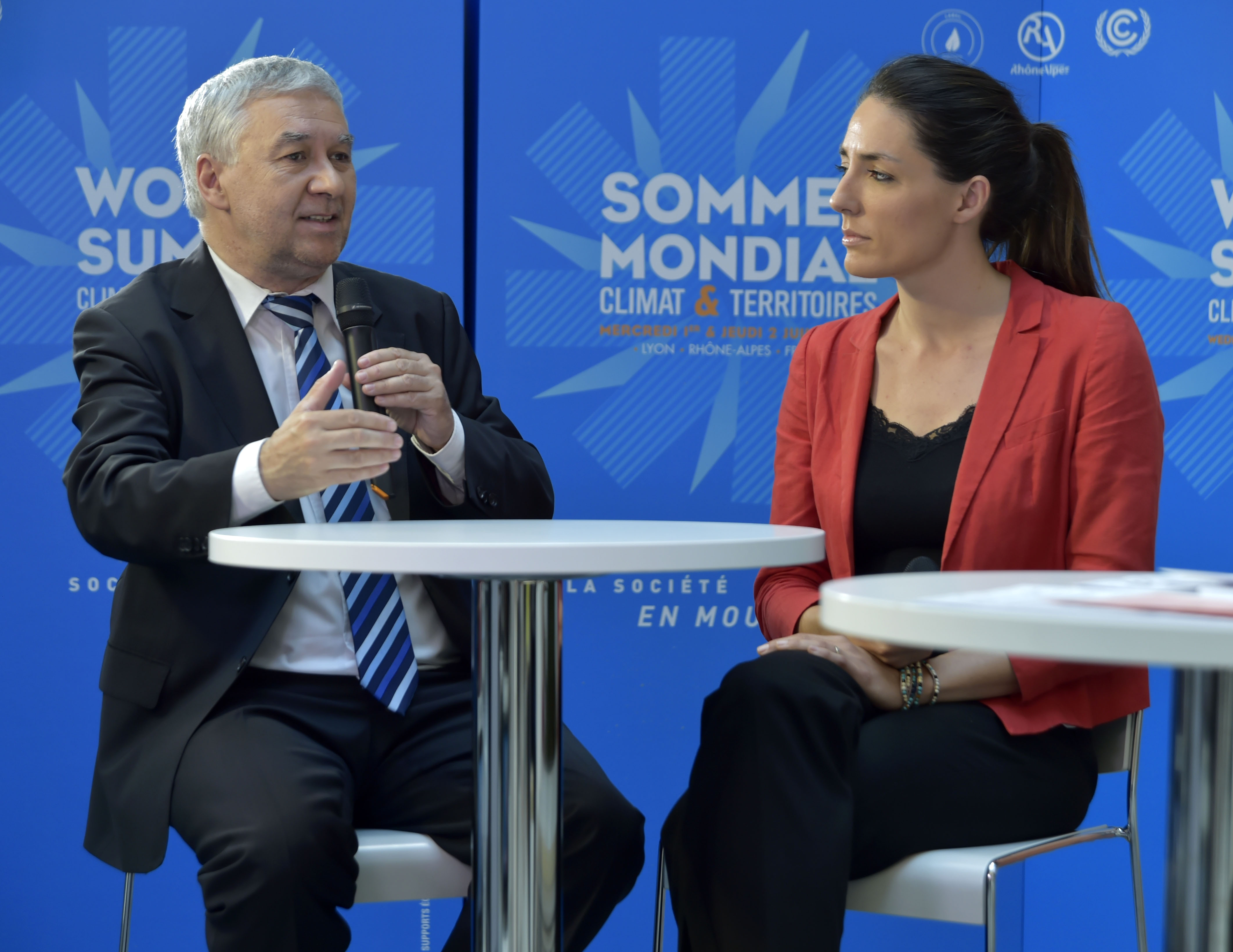Cities and regions from across the world will participate in the climate negotiations in December
08.07.2015
With less than five months to go before the Climate Change Conference to be held in Paris (COP 21), the Rhône-Alpes region gathered around 1,000 elected officials and non-state actors from around the world in Lyon to attend the "World Summit on Climate and Territories", with the intention of analyzing the negotiation process that should lead to an agreement in December.
With less than five months to go before the Climate Change Conference to be held in Paris (COP 21), the Rhône-Alpes region gathered around 1,000 elected officials and non-state actors from around the world in Lyon (local authorities, NGOs, economic actors, social alliances, the youth sector, representatives of women’s associations and the scientific sector, among others) to attend the “World Summit on Climate and Territories“, with the intention of analyzing the negotiation process that should lead to an agreement in December.
The Summit aimed to make the voices of all non-state actors heard and highlight the importance of a territorial approach to climate issues. In recent years, local governments have achieved growing recognition in terms of the importance of their role in the climate negotiations, yet have not been able to achieve anything beyond observer status in the United Nations system, since official negotiator status remains exclusively for States.
Acknowledging the exemplary role that local governments and regional actors play in the fight against climate change, during the meetings in Lyon, François Hollande expressed his desire for local and regional governments to play a full part in climate conference. The French President declared that “in Paris, one day will be devoted to territories. During this day, territories will not only take the floor but also participate in the negotiations
The President of the Republic has also shown his support for one of the biggest demands of local actors: direct access to funds for climate action for regional governments, especially for cities in the South. Financing is “the most important aspect [of the negotiations]. It will be a key factor. […]Further, it is necessary to do justice to your requests: local governments need to be able to access the 100 billion that will be mobilized every year for climate [starting in 2020],” said the Head of State. Janos Pasztor, Deputy Secretary General for Climate Change at the United Nations, underlined that “the real solutions on the ground in the territories are already much more advanced than the governments in the negotiations.” To which he added, addressing the participants: “As mayors, presidents of regions and local authorities, you have the ability to inspire confidence within your governments, to show them that they need your support to raise their ambitions.” Jean-Jack Queyranne, President of the Rhône-Alpes region, which organized the Summit, recalled that the challenge of climate change “is not just scientific or economic, is also social and ethical. It is intimately linked to the humanity we share, the issue of human rights and in particular the most vulnerable populations.” Signed by 50 organizations of territorial actors, the Declaration of Lyon, the outcome of this Summit, is the most supported text ever presented on action for climate change. It anticipates that territories will be better integrated in the contributions of States, for, in the words of Bernard Soulage, Vice President of the Rhône-Alpes region: “It is clear that without them, States cannot achieve their commitments.” During the meetings in Lyon, the networks of local and regional governments reaffirmed their concrete commitments and developed specific proposals to contribute to the efforts of the States to achieve an ambitious and universal new climate agreement in December in Paris. On this occasion, Anne Hidalgo, Mayor of Paris and Co-President of UCLG, recalled the key role that cities play, and invited local and regional authorities from across the world to meet again for the Summit of Local and Regional Authorities for Climate on 4 December in Paris City Hall, in the framework of COP 21. This Summit will aim to renew commitments and support the ongoing negotiations of local authorities. The UCLG World Council will also be held on this occasion. The Mayor of Bogotá, Gustavo Petro, also invited participants to attend a Climate Summit to be held in his city between 20 and 23 September, which will bring together local authorities and civil society in the region. The commitments from all major global networks of local governments to support their members to reduce greenhouse gas emissions between 2020 and 2050 described in Lyon are consistent with the international community’s aim to limit the increase in global average temperature below 2°C. Khalifa Sall, Mayor of Dakar and President of UCLG Africa, stated that: “Territories across the world have in common that they are affected by climate change and its consequences. The elected officials that manage these territories also have in common that they are closer to their citizens, to the things that affect them, to their needs and requirements. This is why UCLG committed, many years ago, to the fight against climate change, taking part in coalitions among actors, such as the road map of local and regional governments for climate since 2007, as well as collaborative work implemented among the Major Groups, bringing together representatives of civil society, the private sector, trade unions and other key actors in this field.” The last of these commitments made by UCLG is the Coalition of Mayors, better known as the Compact of Mayors
Speaking on behalf of Metropolis, the UCLG Section representing the world’s major metropolises, Adama Sangare, Mayor of Bamako, also echoed the commitments made by the organization, reiterating that: “We, the Metropolis network, representing 685 million citizens around the world commit to supporting our members to manage their greenhouse gas emissions, based on a quantitative target for each city, which is compatible with a scenario that does not exceed 2°C, taking into account the circumstances and level of development of each metropolis, and providing that the frameworks and means of action are reinforced.” Following the closing of the Conference in Lyon and with five months to go before the World Climate Summit in Paris, the key points on the agenda and the commitments made by the territories are clear. Territorial actors are on the front lines of the fight against global warming and have put forward their proposals; and States must take these into account in the negotiations in Paris in order to curb global warming and reach the target proposed by the international community. The World Summit Climate and Territories, a milestone leading up to COP21
Territorial action is at the core of the response to the challenges of climate change
 The Declaration also includes proposals that the signatories expect to see included in the negotiation document of the agreement to take place in Paris; in particular with regard to facilitating local and regional governments’ access to green climate funds. This was an issue discussed at the workshop supported by GERES (Group for the Environment, Renewable Energy and Solidarity) and the UCLG Committee on Local Finance for Development.
The Declaration also includes proposals that the signatories expect to see included in the negotiation document of the agreement to take place in Paris; in particular with regard to facilitating local and regional governments’ access to green climate funds. This was an issue discussed at the workshop supported by GERES (Group for the Environment, Renewable Energy and Solidarity) and the UCLG Committee on Local Finance for Development.
 To conclude, in the closing session of the Summit, Ronan Dantec, French Senator, Municipal Councillor of Nantes and UCLG Climate spokesman, affirmed: “These commitments help to give credibility to this scenario of climatic stability, to ensure global warming is maintained below 2°C. […] If all the territories across the world mobilize, we can achieve this scenario.”
To conclude, in the closing session of the Summit, Ronan Dantec, French Senator, Municipal Councillor of Nantes and UCLG Climate spokesman, affirmed: “These commitments help to give credibility to this scenario of climatic stability, to ensure global warming is maintained below 2°C. […] If all the territories across the world mobilize, we can achieve this scenario.”
For more info check out the following documents:
Related news: